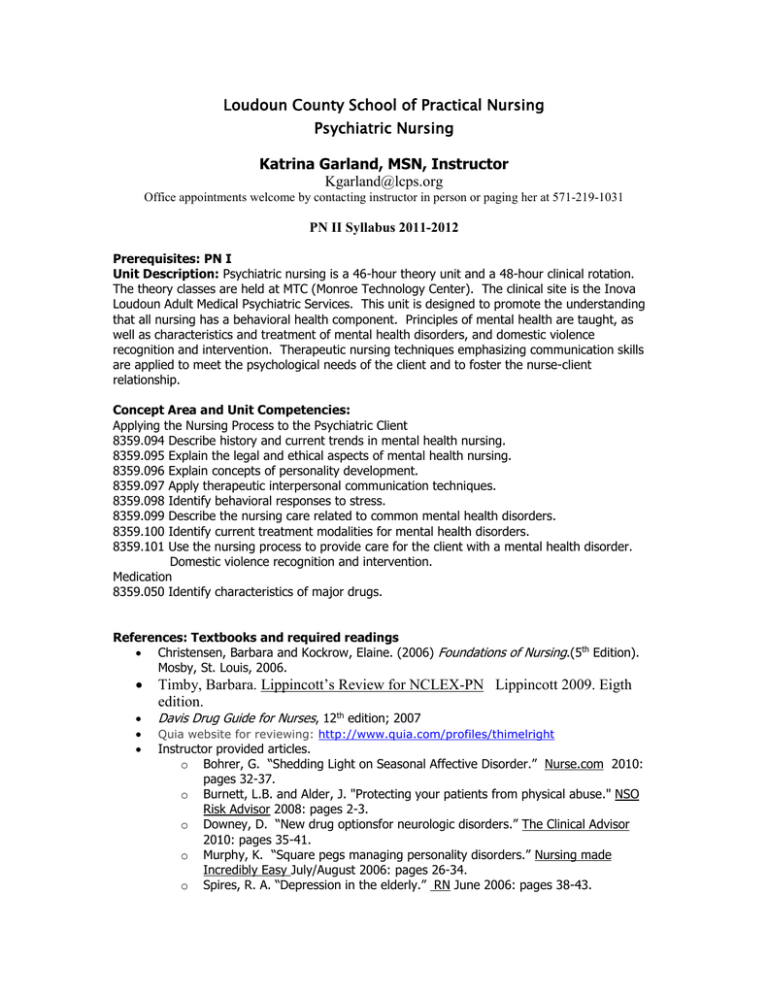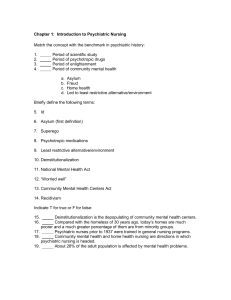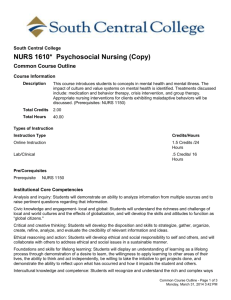loudoun county school of practical nursing
advertisement

Loudoun County School of Practical Nursing Psychiatric Nursing Katrina Garland, MSN, Instructor Kgarland@lcps.org Office appointments welcome by contacting instructor in person or paging her at 571-219-1031 PN II Syllabus 2011-2012 Prerequisites: PN I Unit Description: Psychiatric nursing is a 46-hour theory unit and a 48-hour clinical rotation. The theory classes are held at MTC (Monroe Technology Center). The clinical site is the Inova Loudoun Adult Medical Psychiatric Services. This unit is designed to promote the understanding that all nursing has a behavioral health component. Principles of mental health are taught, as well as characteristics and treatment of mental health disorders, and domestic violence recognition and intervention. Therapeutic nursing techniques emphasizing communication skills are applied to meet the psychological needs of the client and to foster the nurse-client relationship. Concept Area and Unit Competencies: Applying the Nursing Process to the Psychiatric Client 8359.094 Describe history and current trends in mental health nursing. 8359.095 Explain the legal and ethical aspects of mental health nursing. 8359.096 Explain concepts of personality development. 8359.097 Apply therapeutic interpersonal communication techniques. 8359.098 Identify behavioral responses to stress. 8359.099 Describe the nursing care related to common mental health disorders. 8359.100 Identify current treatment modalities for mental health disorders. 8359.101 Use the nursing process to provide care for the client with a mental health disorder. Domestic violence recognition and intervention. Medication 8359.050 Identify characteristics of major drugs. References: Textbooks and required readings Christensen, Barbara and Kockrow, Elaine. (2006) Foundations of Nursing.(5th Edition). Mosby, St. Louis, 2006. Timby, Barbara. Lippincott’s Review for NCLEX-PN Lippincott 2009. Eigth edition. Davis Drug Guide for Nurses, 12th edition; 2007 Quia website for reviewing: http://www.quia.com/profiles/thimelright Instructor provided articles. o Bohrer, G. “Shedding Light on Seasonal Affective Disorder.” Nurse.com 2010: pages 32-37. o Burnett, L.B. and Alder, J. "Protecting your patients from physical abuse." NSO Risk Advisor 2008: pages 2-3. o Downey, D. “New drug optionsfor neurologic disorders.” The Clinical Advisor 2010: pages 35-41. o Murphy, K. “Square pegs managing personality disorders.” Nursing made Incredibly Easy July/August 2006: pages 26-34. o Spires, R. A. “Depression in the elderly.” RN June 2006: pages 38-43. Grading: A grade of 80% in theory and a satisfactory in clinical is required to successfully complete the unit. Loudoun County Public School Grading Scale will be used for letter grades. A+ A AB+ B BC+ 98-100 93-97 90-92 87-89 83-86 80-82 77-79 C CD+ D DF Area Summer assignmentmath and drug problems Summer assignmentJump start to clinical drug cards Summer assignment – Alcoholic Anonymous assignment and case studies Class Participation and homework assignments Presentation treatments Four Tests Test 1: Mental Health History/ Psychiatric Disorders including children Test 2: Addictive Disorders Test 3: Domestic Violence/ Legal and ethical issues Test 4: Psychiatric Medications Final grade 73-76 70-72 67-69 63-66 60-62 0-59 Total Points Awarded 25 % of Final Grade 2.5 % 50 5% 75 7.5 % 25 2.5% 25 2.5% 200 20% 200 200 20% 20% 200 1000 points 20% 100% Format and Expectations: A student in PN II is allowed to miss 31.5 hours without the requirement of makeup time or being placed on probation. Any time missed over 31.5 hours must be made up in the clinical area before graduation and consists of being placed on attendance probation. A maximum of 63 hours may be missed in PN II. Please refer to the student handbook for attendance policy. Classroom rules are posted. Classroom formats include: lecture, presentations, power point student presentations, brainstorming, group work, games, computer lab work, QUIA, guest lectures, audiovisuals etc. Classroom participation is expected. Clinical format involves the care of clients at Inova Loudoun Adult Medical Psychiatric Services. Helpful Hints: Be on time and be prepared, if you know that you will be absent inform the instructor and have a fellow student pick up your missed work. All work that is missed will be due when the student returns within reasonable time period. Bring your textbooks everyday to class along with any other nursing homework or projects that you could be working on. If you are having difficulty in a subject let the instructor know ASAP. Consider forming a study group of people that you can really work with. Plan on studying one to two hours a night and use techniques that will help you retain information. If there is a rubric for grading to be used, follow it! Outline of the Unit: Read Unit seven and complete the study guides for chapters 34, 35, and 36 in Christensen and Kockrow Foundations of Nursing Textbook. We will study by following your textbook sequence and use other classroom and Internet resources. 1. History and trends in mental health nursing (Chapter 34) Historical Overview of Mental Health Care 2. Basic Concepts in Mental Health Mental health continuum Personality development and self concept (Freud, Maslow, Erickson and Piaget) Stress and anxiety Adaptation, coping and defense mechanisms Illness behaviors Crisis intervention Keeping yourself safe with psychiatric clients NANDA nursing diagnoses for the psychiatric and mental health nursing 3. Therapeutic interpersonal communication techniques. Review of techniques and goals of these techniques 4. Care of the client with a psychiatric disorder (Chapter 35) Organic Mental Disorders Thought Process Disorders Major Mood Disorders (Depression and Bipolar Disorders) Anxiety Disorders Personality Disorders Sexual Disorders Psychophysiological (Somatoform) Disorders Eating Disorders Overview of Treatment Methods o Electroconvulsive Therapy o Alternative Therapies Application on the Nursing Process Children mental health diseases Exam I 5. Care of the Client with an Addictive Personality (Chapter 36) Stages of Dependence Alcohol Abuse and Alcoholism Assessment Diagnostic Tests Nursing Diagnoses and Interventions Rehabilitation o Group therapy o Alcoholics Anonymous o Treatment Centers o Pain Management Drug Abuse o Depressants o Opioid Analgesics o Stimulants o Hallucinogens o Cannabis o Inhalants Exam II 6. Domestic violence recognition and interventions (Video and Handouts) 7. Legal and ethical aspects of mental health nursing HIPPA The chemically impaired health professional Exam III 8. Psychiatric Medications (Chapter 34, 35, 36 and video) Exam IV




